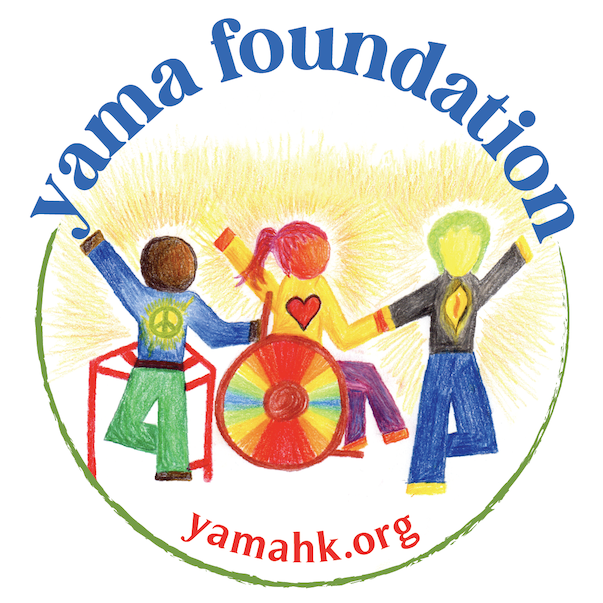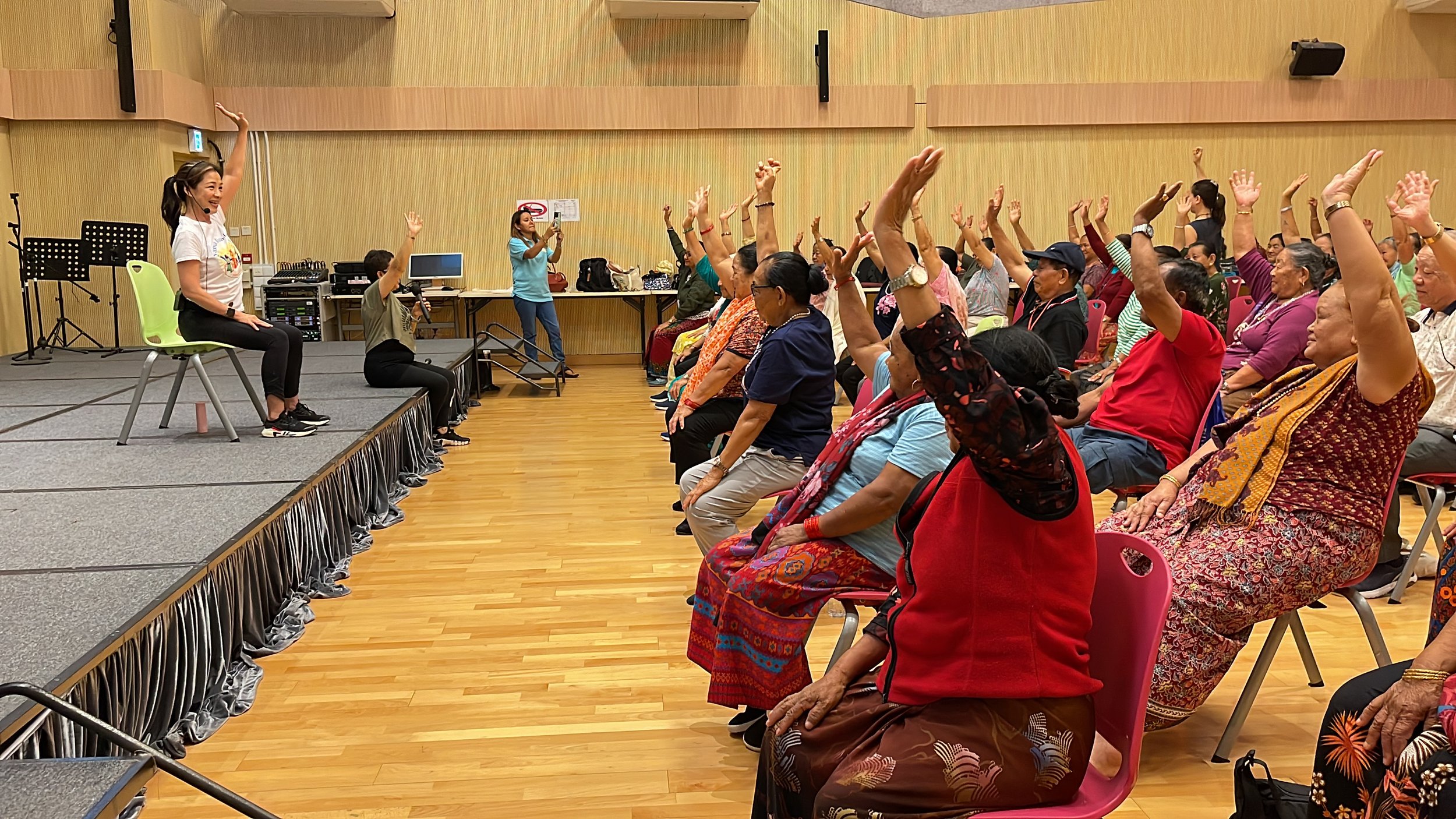The Role of Yoga in Supporting Ageing Populations 瑜伽在支援高齡人口中的角色
Teacher Pacsy leads a senior Chair Yoga class. | Pacsy 老師正在帶領長者椅子瑜伽
As the global population continues to age, it’s becoming increasingly clear that chronological age is not a reliable indicator of an individual’s physical or mental condition. While ageing does bring natural changes to the body, many common assumptions about what can and cannot be improved are misguided. Seniors often face conditions like hypertension, high cholesterol, arthritis, dementia, and more. However, on closer examination, many of these ailments are interconnected and can be influenced by lifestyle factors rather than just genetics or environment.
In fact, a significant proportion of chronic conditions seen in the elderly population are tied to three main areas: physical activity and nutrition (an easeful body), stress management and mindset (a peaceful mind), and social connection and purpose (a useful life). Addressing these areas holistically can promote better health outcomes and improve quality of life. This is where yoga steps in as a powerful tool, offering both preventative and therapeutic benefits for seniors.
Current Challenges Facing the Elderly Population
One of the most pressing issues among ageing populations is the loss of mobility and independence. Physical inactivity often leads to a decline in muscular strength, flexibility, and balance, increasing the risk of falls. In Hong Kong, for example, one in five individuals aged 65 and above experiences a fall at least once a year – equating to an annual fall rate of 18-20%. These falls can have devastating effects on physical health, emotional wellbeing, and independence.
Chronic conditions like hypertension, arthritis, and stress-related illnesses also disproportionately affect seniors. Many of these are exacerbated by limited physical activity, poor stress management, and a lack of social engagement. The growing elderly population highlights the urgent need for preventative measures that address both physical and mental wellbeing.
How Yoga Can Help as a Preventative Measure
Yoga is uniquely positioned to support seniors by addressing their physical, mental, and emotional health in a holistic manner. It is not just an exercise practice; it also fosters mindfulness, self-awareness, and connection. Research has shown that regular yoga practice has numerous benefits for older adults, including:
Improved range of motion: Yoga helps maintain and enhance flexibility, which is vital for everyday activities and mobility.
Better balance and coordination: This significantly reduces the risk of falls and associated injuries.
Strength training: Gentle poses improve muscular strength, promoting greater independence.
Adaptability for health conditions: Yoga can be tailored to individual needs, allowing seniors with arthritis, hypertension, or other conditions to practice safely.
Stress reduction: Breathing exercises and meditation reduce anxiety, helping seniors manage stress more effectively.
Increased mindfulness: Yoga teaches individuals to listen to their bodies, fostering a deeper connection between mind and body.
Social engagement: Group yoga classes encourage a sense of community and combat feelings of isolation.
The holistic nature of yoga makes it particularly effective for addressing the interconnected challenges faced by seniors. By fostering a strong mind-body connection, yoga not only improves physical health but also enhances mental clarity, emotional resilience, and overall quality of life.
YAMA’s Approach to Yoga Therapy for Seniors
At YAMA, we are committed to helping seniors lead healthier, more fulfilling lives through yoga therapy. Our tailored programmes are designed to address the specific needs of the ageing population, focusing on prevention, rehabilitation, and holistic wellbeing.
Our yoga therapy for seniors emphasises:
Personalised practice: Each session is adapted to suit individual health conditions and physical abilities, ensuring a safe and effective experience.
Mind-body connection: We integrate pranayama (breathing exercises) and meditation into our sessions to reduce stress and promote mindfulness.
Strength and balance training: Targeted poses build muscular strength and improve balance, helping seniors stay active and independent.
Community building: Group classes foster social connection, offering emotional support and reducing feelings of isolation.
At YAMA, we understand that ageing is a natural process, but one that can be navigated with grace and resilience. Our mission is to empower seniors to take charge of their health through the transformative power of yoga.
If you’re interested in learning more about how yoga therapy can support seniors or want to join one of YAMA’s programmes, reach out to us today at hello@yamahk.org
隨着全球人口逐漸老齡化,越來越多研究顯示,單以年齡推算一個人的身心狀況並不準確。雖然年齡增長的確會為身體帶來自然變化,但我們對於老化所能改善與否的種種觀念,往往存在誤解。長者普遍面對的健康問題包括高血壓、高膽固醇、關節炎、認知障礙等。然而,若細心觀察,不難發現這些疾病之間往往相互關聯,其成因亦不僅限於基因或環境,生活方式亦扮演着關鍵角色
事實上,長者常見的慢性病中,有相當大部分可追溯至三個主要層面:身體活動與營養(身體舒暢)、壓力管理與心態調整(心境平和)、以及社交聯繫與生活意義(生命有用)。若能以整全方式處理這三方面,不但有助改善健康狀況,更可顯著提升生活質素。亦正正如此,瑜伽發揮出其獨特價值 —— 作為一種結合預防與治療效益的整合工具,為長者身心健康提供有效力的支援。
現今高齡人口所面對的主要挑戰
在高齡人口中,最迫切的問題之一,是活動能力與自理能力的流失。身體活動不足往往導致肌力、柔軟度及平衡力下降,從而大大增加跌倒風險。以香港為例,每五位65歲或以上的長者當中,便有一位每年至少跌倒一次,跌倒比率高達18%至20%。這些意外不但可能造成嚴重身體損傷,更會影響長者的情緒健康及生活自理能力,對其整體福祉構成沉重打擊。
高血壓、關節炎及與壓力相關的慢性疾病,亦普遍困擾長者羣體。這些健康問題往往因缺乏適量運動、壓力管理不足及社交互動欠缺而進一步惡化。隨着長者人口持續上升,社會對促進身心健康的預防性措施需求日益迫切。我們必須從身體與心理兩方面著手,推動更全面的長者健康支援系統。
瑜伽作為預防性措施的作用
瑜伽獨具優勢,能以整全方式照顧長者的身體、心理及情緒健康。它不僅是一種鍛鍊形式,更能培養正念、自我覺察以及人際連結。
研究指出,長者定期練習瑜伽有助於帶來多方面益處,包括:
改善關節活動幅度:瑜伽有助維持及提升柔軟度,對日常活動及行動能力至關重要。
提升平衡力與協調能力:有效減低跌倒風險及相關受傷情況。
溫和的肌力訓練:透過簡單體位法增強肌肉力量,促進自理能力與獨立性。
配合個人健康狀況調整:瑜伽可因應個別需要調節,讓患有關節炎、高血壓等慢性疾病的長者也可安心練習。
減輕壓力:呼吸練習與冥想有助紓緩焦慮,提升情緒管理能力。
增強覺察力:瑜伽教導學員傾聽身體訊號,深化身心連結。
促進社交互動:團體課堂培養社區感,減少孤獨與社交隔離。
瑜伽的整全性正正切合長者面對的多重健康挑戰。透過強化身心連結,瑜伽不僅有助改善體能狀況,更能提升專注力、情緒韌性,從而全面改善生活質素。
YAMA 推行的長者瑜伽治療理念
在 YAMA,我們致力透過瑜伽治療協助長者活出更健康、更有意義的生活。我們所設計的課程針對長者羣體的實際需要,著重預防、復康及整全身心健康福祉的提升。
YAMA 的長者瑜伽治療著重以下幾個核心元素:
個人化練習:每節課均根據參加者的健康狀況及身體能力作出調整,確保練習安全而有效。
身心連結:課堂中融合呼吸法(Pranayama)及冥想,協助減壓及培養正念覺察。
肌力和平衡訓練:針對性體位法有助增強肌肉力量及改善平衡力,讓長者保持活躍與自主生活能力。
社區連結:小組課程營造互動氛圍,促進情感支援,紓緩孤獨感,建立歸屬感。
在 YAMA,我們深切明白,衰老是人生的自然歷程,但亦可以以安然與堅韌的姿態走過。我們的使命,是透過瑜伽的轉化力量,賦予長者自主照顧健康的能力。
如欲了解更多有關長者瑜伽治療的資訊,或希望參加 YAMA 的相關課程,歡迎隨時電郵至 hello@yamahk.org 與我們聯絡。

